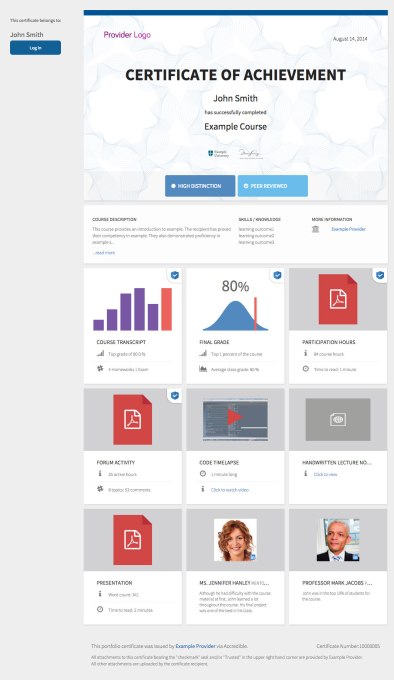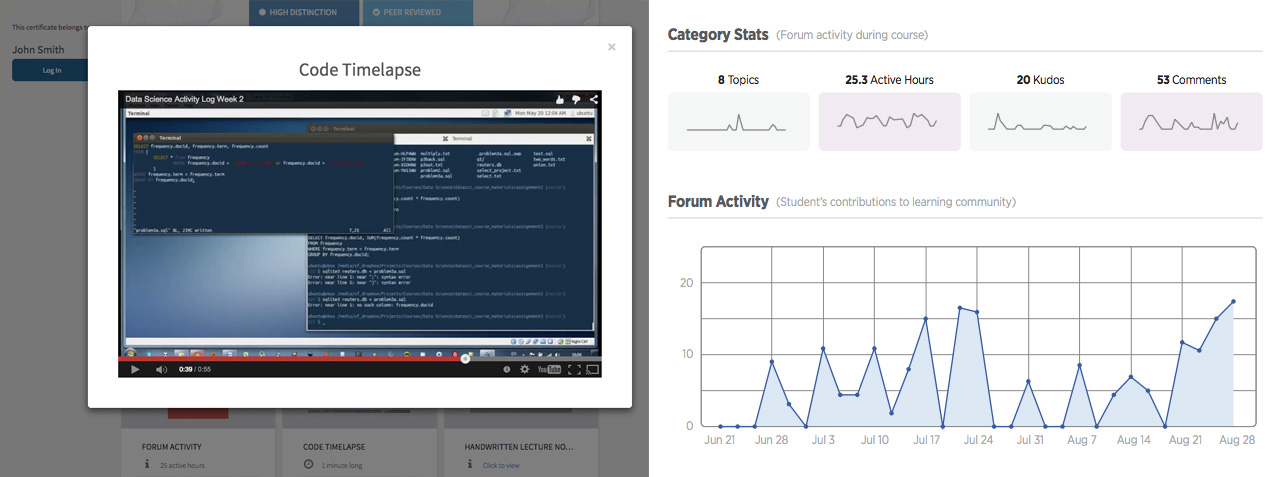Accredible, which provides online credentials as a service, is announcing a partnership today to provide digital certificates for Udacity’s burgeoning nanodegree program. The startup has created an API that pulls data from existing online learning platforms — in this case Udacity — and creates an online certificate that summarizes the student’s behavior and learning in a course.
For example, while a student’s overall grade and ranking in a course is important, it may be interesting to potential employers to be able to view that student’s code and final presentation and see what types of engagement they had with a community, as well as impressions from mentors or instructors. With Accredible, students can also supplement the certificate with portfolios pieces, personal notes, etc.
 Accredible is not new to the online credentialing space. Launched nearly two-and-a-half years ago, in the height of the MOOC hysteria, the company was originally founded with a focus on self-reporting, meaning that students would populate a certificate with their own impressions of what they learned. Though a necessary step, reporting was non-uniform and highly subjective.
Accredible is not new to the online credentialing space. Launched nearly two-and-a-half years ago, in the height of the MOOC hysteria, the company was originally founded with a focus on self-reporting, meaning that students would populate a certificate with their own impressions of what they learned. Though a necessary step, reporting was non-uniform and highly subjective.
Fast forward a few years and feelings toward MOOCs are more tempered. Completion rates are low and those that do finish the courses are most often doing so out of curiosity or to advance in their current jobs.
Some critics chalk this phenomenon up to the fact that online courses did little to ensure student outcomes. Sure, a student completed a course, but what did they really learn?
In the case of traditional higher education, institutions themselves lend brand credibility to a student, signaling to employers that the student has some base knowledge and skills. Yet, from an educational perspective, this system is imperfect. It is rooted firmly in reputation rather than students’ actual learning. Accredible’s new API brings transparency to student learning online without adding additional work for the content platform or the end user.
Accredible founder Danny King says that more transparent systems are ultimately more fair to students and potentially useful for employers. If Accredible is able to achieve scale, this isn’t an unreasonable trajectory to imagine.

Of course, the Internet is a big place and providing credentials for all online courses will take time and likely some consolidation of the market. Still, partnering with Udacity is a step in the right direction.
Of the big MOOC players, Udacity was an early mover in transitioning from general, open courses, to pay-for-play, career-focused content. Since October 2014, when nanodegrees were first launched, programs have seen over 3,000 active students each month.
Accredible will be rolling out additional partnerships in the coming months, enabling MOOC platforms to continue to focus on creating and curating great content. King says the company is eager to observe if and how this new certification method shifts the demographics of those completing online courses.
Perhaps there will be a time in the not so distant future when online courses will reach their true potential, providing access to high quality education and the dream of economic mobility for anyone around the world.
